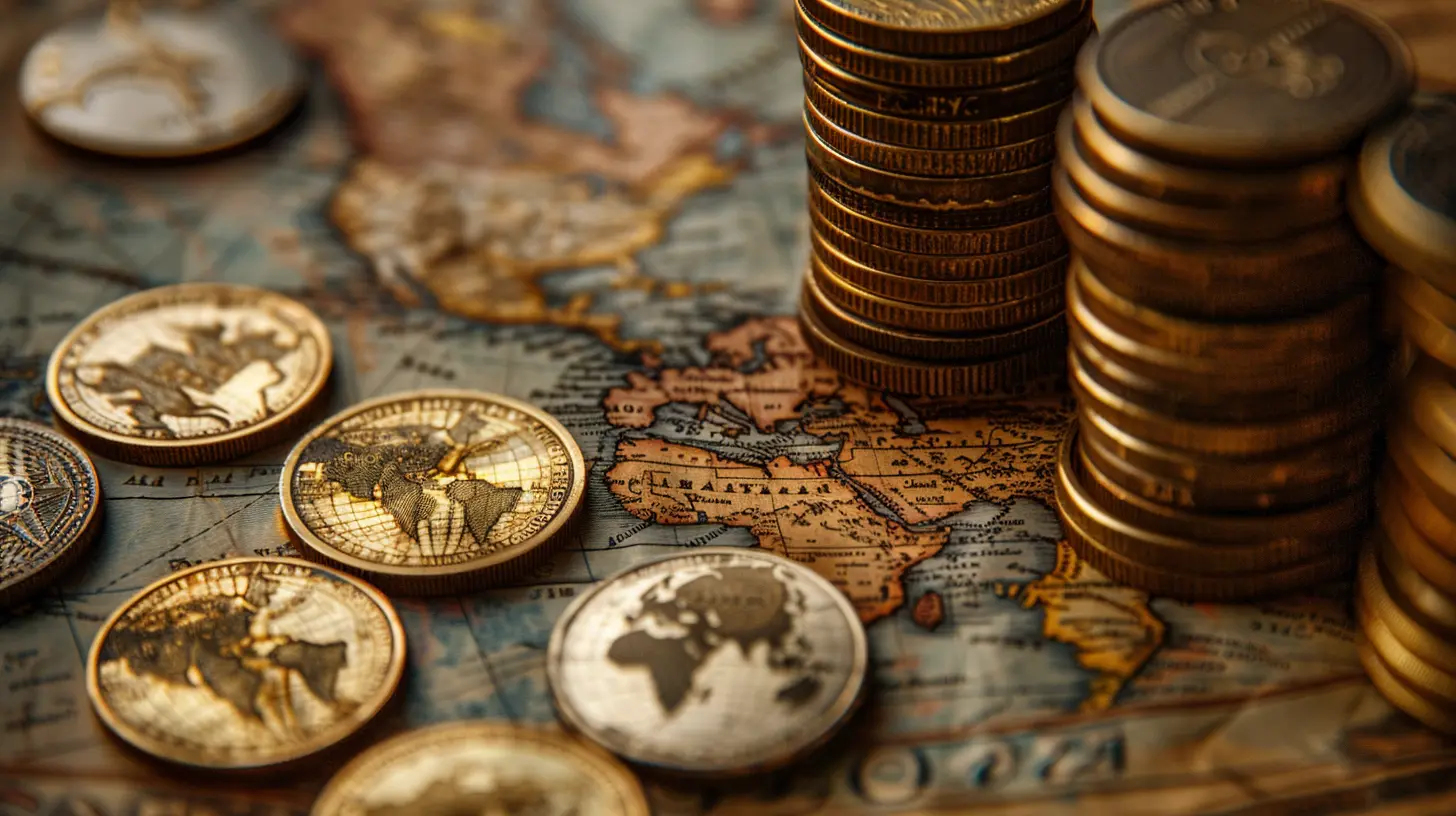Offshore Accounts for Digital Nomads: Global Banking Solutions
4 July 2025
In today’s fast-paced, Wi-Fi-powered world, the term “home” doesn’t always mean a fixed address or a white picket fence. For digital nomads, home could be a beach in Bali today and a coffee shop in Lisbon tomorrow. But while the lifestyle sounds like a dream (and let’s be honest—it kind of is), managing money across time zones, currencies, and tax regulations can quickly become a nightmare.
Enter offshore banking.
Now, before your mind drifts to images of secret Swiss vaults or yachts anchored off the Cayman Islands, let’s set the record straight. Offshore accounts aren’t just for Bond villains or tax evaders. In fact, for digital nomads, they're often essential tools for financial independence and peace of mind.
So, let’s unpack this financial backpack together and dive deep into the world of offshore accounts for digital nomads.
Why Offshore Banking Matters for Digital Nomads
Alright, let’s start with the basics.Offshore banking means holding an account in a country where you don’t reside. That’s it—no shady underworld dealings involved. For digital nomads, whose income might come from five clients in five different countries, offshore banking can be the thing that keeps everything running smoothly.
1. Global Access to Your Money
You don’t want to be stuck in Thailand with a debit card that won’t work because your home bank freaked out about a “suspicious” transaction. Offshore accounts give you financial flexibility. You can access your funds no matter where you are—no frantic international calls to your bank required.2. Multi-Currency Support
Currency conversion fees are sneaky little budget killers. When you have an offshore account, especially one that supports multiple currencies, you can hold, send, and receive money in the local currency. That’s more money for gelato in Rome or tacos in Mexico City.3. Tax Optimization (Not Evasion!)
Let’s get this clear: opening an offshore account doesn’t mean dodging taxes. It means being strategic. Different countries have different tax treaties, and with the right setup (and ideally a competent international tax advisor), you might be able to legally reduce your tax burden. Think of it like using every tool in your financial toolbox.4. Asset Protection and Financial Privacy
Ever heard the phrase “don’t put all your eggs in one basket”? Offshore accounts help diversify your financial risk. If something happens to your home country’s banking system (hello, economic crisis), your offshore funds can act as a financial life raft.
Best Countries for Offshore Banking as a Digital Nomad
Not all offshore banking destinations are created equal. Some cater specifically to global citizens and digital workers. Let’s run through a few nomad-friendly countries that offer excellent banking services.1. Singapore
Known for its stability and world-class banking infrastructure, Singapore offers easy online access and multi-currency accounts. Plus, English is widely spoken, which makes managing your money less of a headache.2. Estonia
Estonia is one of the most digital-friendly countries on earth. Their e-Residency program allows you to open a business and bank account without ever stepping foot in the country. Perfect for tech-savvy nomads.3. Georgia
No, not the U.S. state. We're talking about the country wedged between Europe and Asia. Georgia offers easy banking, minimal paperwork, and low taxes—plus it’s a beautiful place to chill for a while.4. Germany
If you're looking for a strong and stable banking system with global reach, Germany’s banks offer robust online banking services and are ideal for EU-based nomads.5. Belize
For those who prioritize privacy and asset protection, Belize is a top-tier option. Though not the easiest place to open an account remotely, it offers strong legal protections for account holders.
Features to Look for in an Offshore Account
Think of this like choosing the right backpack—it needs to be functional, durable, and suited to your travel style.✔️ Online Accessibility
If you can check your bank account while sipping a coconut in Bali or waiting for a train in Budapest, you’re golden.✔️ Multi-Currency Capabilities
Look for banks that let you hold different currencies under one roof. This saves you money in the long run and protects you from wild FX fluctuations.✔️ Low Fees
Some offshore accounts come with hefty monthly or transactional fees. Compare those like you would Airbnb listings—there’s always a better deal out there.✔️ Integration with PayPal, Stripe, Wise, etc.
Digital income often flows through platforms like Payoneer, PayPal, or Stripe. Make sure your offshore bank plays nicely with these tools.✔️ Strong Legal Protections
Choose jurisdictions with solid legal frameworks. If things go sideways, you want a system that protects your rights as a foreign account holder.
What Are the Legal Considerations?
Let’s hit pause for a second. While offshore banking is 100% legal, you don't want to get into hot water by avoiding your tax responsibilities.🧾 Reporting Requirements
Most countries require you to report foreign accounts if the balance exceeds a certain amount. For instance, U.S. citizens have to file an FBAR if their account exceeds $10,000 at any point during the year.💼 Hire an International Tax Advisor
Seriously, don’t skimp on this. Every country’s tax system is a different beast. A good advisor will help you stay compliant while optimizing your financial strategy.How to Open an Offshore Bank Account
It’s not quite as simple as walking into a bank with a passport and a smile—though in some countries, it almost is.Here’s a step-by-step guide:
1. Choose the Right Country – Consider factors like taxation, political stability, and banking laws.
2. Find a Suitable Bank – Read reviews, talk to other digital nomads, and reach out to the bank directly.
3. Gather Your Documents – Usually includes your passport, proof of address, and a reference letter from your current bank.
4. Apply (Online or In Person) – While some countries (like Estonia) allow you to do everything remotely, others might require you to show up in person.
5. Deposit Initial Funds – Many banks require an initial deposit—could be $500 or $5,000, depending on the institution.
Alternatives to Traditional Offshore Banking
Let’s say you’re not ready to deep-dive into another country’s banking system. No sweat. There are digital options that mimic the benefits of offshore accounts without all the friction.✳️ Digital Banks
Think Wise (formerly TransferWise), Revolut, or N26. These fintech platforms support multiple currencies, offer global access, and come with slick mobile apps. They’re not always technically “offshore,” but for many digital nomads, they check all the right boxes.🌐 e-Money Institutions
Platforms like Payoneer or Paysera offer international banking services without the red tape. Great for freelancers and remote workers who need fast, reliable payments across borders.Common Myths About Offshore Accounts
Let’s bust a few myths, shall we?❌ "Offshore Accounts Are Illegal"
Nope. Totally legal—as long as you report them properly and meet your tax obligations.❌ "Only Rich People Need Them"
You don’t need to be rolling in Bitcoin or sipping champagne at a beach resort to benefit from an offshore account. Even modest earners can gain big advantages.❌ "They’re Hard to Open"
Some are, sure. But more and more banks are adapting to the digital age, making it easier than ever to open accounts remotely.Final Thoughts: Is Offshore Banking Right for You?
If you're living the digital nomad life—constantly on the move, juggling clients from Australia to Argentina, and dreaming of financial peace of mind—then yes, offshore banking might be your golden ticket.It offers the global access, flexibility, and security you need to thrive in a lifestyle that defies borders. But like choosing the right travel insurance or Wi-Fi hotspot, it pays to do your homework.
Be smart. Be compliant. And most importantly, be free to chase your dreams—wherever they take you.
all images in this post were generated using AI tools
Category:
Offshore AccountsAuthor:

Audrey Bellamy
Discussion
rate this article
1 comments
Bryson McInnes
This article provides valuable insights into offshore accounts for digital nomads. It highlights the importance of understanding regulatory frameworks and the benefits of global banking. However, I wonder about the potential risks and ethical considerations involved. Transparency and due diligence are crucial in navigating this landscape.
July 14, 2025 at 4:21 AM

Audrey Bellamy
Thank you for your thoughtful comment! You're absolutely right—while offshore accounts offer many benefits for digital nomads, understanding the associated risks and maintaining transparency is essential for responsible financial management.


